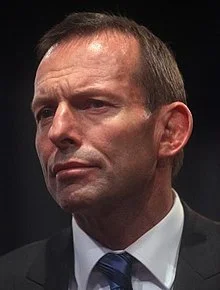
Tony Abbott
Tony Abbott, born on November 4, 1957, in London, England, is a prominent Australian politician who served as the 28th Prime Minister of Australia from 2013 to 2015. Raised in Sydney, Abbott pursued a Bachelor of Economics and a Bachelor of Laws at the University of Sydney before proceeding to The Queen's College, Oxford, as a Rhodes Scholar, where he earned a Master of Arts in Politics and Philosophy. His political career began as a member of the Liberal Party, and he was first elected to the House of Representatives in 1994 for Warringah. Abbott held various ministerial positions in the Howard Government, including Health Minister. Known for his conservative views, Abbott played a pivotal role in opposition before leading the Liberal Party to victory in the 2013 federal election. His tenure as Prime Minister was marked by strong stances on immigration and economic policies, though his leadership was often mired in controversy, leading to his eventual replacement by Malcolm Turnbull in 2015.
Books Mentioned on The Jordan B Peterson Podcast #393 - Tony Abbott
The Makings of a Great Leader: Tony Abbott's Insights on the Jordan B. Peterson Podcast #393
In episode #393 of the Jordan B. Peterson Podcast, Peterson converses with Tony Abbott, the former Prime Minister of Australia. The discussion spans various topics, including Australia’s role on the world stage, the challenges facing the West, and the implications of the climate change debate.
Australia's Global Role and History
Abbott begins by discussing Australia’s unique position in the world – significant enough to matter but not so large as to be threatening. He reflects on Australia’s history of being a welcoming nation to migrants and its role in global conflicts, maintaining a reputation as a free and fair country.
Current Challenges and Economic Issues
Abbott addresses the challenges Australia faces, similar to those confronting other Western countries, including risks of recession, inflation, supply chain issues, and energy problems. He criticizes the excessive focus on emissions reduction, arguing that it causes economic harm without benefiting the global environment.
The Emissions Obsession and Its Consequences
Abbott elaborates on the negative impacts of the ’emissions obsession’, claiming it leads to economic self-harm. He questions why nations like Australia export coal and gas but refrain from using them domestically. Abbott suggests that this policy is more about virtue signaling than effective environmentalism.
Australia's Stance on Nuclear Power
The discussion touches on nuclear power, with Abbott advocating for it as a viable, emissions-free energy source. He expresses frustration over the opposition to nuclear energy among those who are most vocal about reducing emissions.
The Cultural War and Its Impact
Abbott describes how cultural issues affecting the West are manifesting in Australia, with universities and schools shifting focus from rigorous learning to ‘brainwashing’ and social niceties. He emphasizes the need for a return to traditional educational values.
The Role of Faith and Traditional Beliefs
Peterson and Abbott explore the role of faith in modern society. Abbott, a man of traditional faith, discusses how faith and humility have shaped his worldview and approach to leadership. He stresses the importance of purpose and belief in something greater than oneself.
Leadership and Political Integrity
The conversation shifts to political integrity, with Abbott reflecting on his time as Prime Minister. He emphasizes the importance of being forthright and committed to one’s principles, even at the cost of political popularity.
Global Politics: China, Taiwan, and Russia
Abbott shares his views on global politics, especially the situations with China, Taiwan, and Russia. He criticizes China’s oppressive regime and discusses the potential threat to Taiwan. On Russia, Abbott condemns Putin’s actions in Ukraine, advocating for Western support to the Ukrainian resistance.
Conclusion: The Need for Principle-Driven Leadership
The podcast concludes with reflections on the importance of principled leadership in both national and international affairs. Abbott’s insights highlight the complexities of navigating the modern political landscape while maintaining integrity and a commitment to foundational values.
